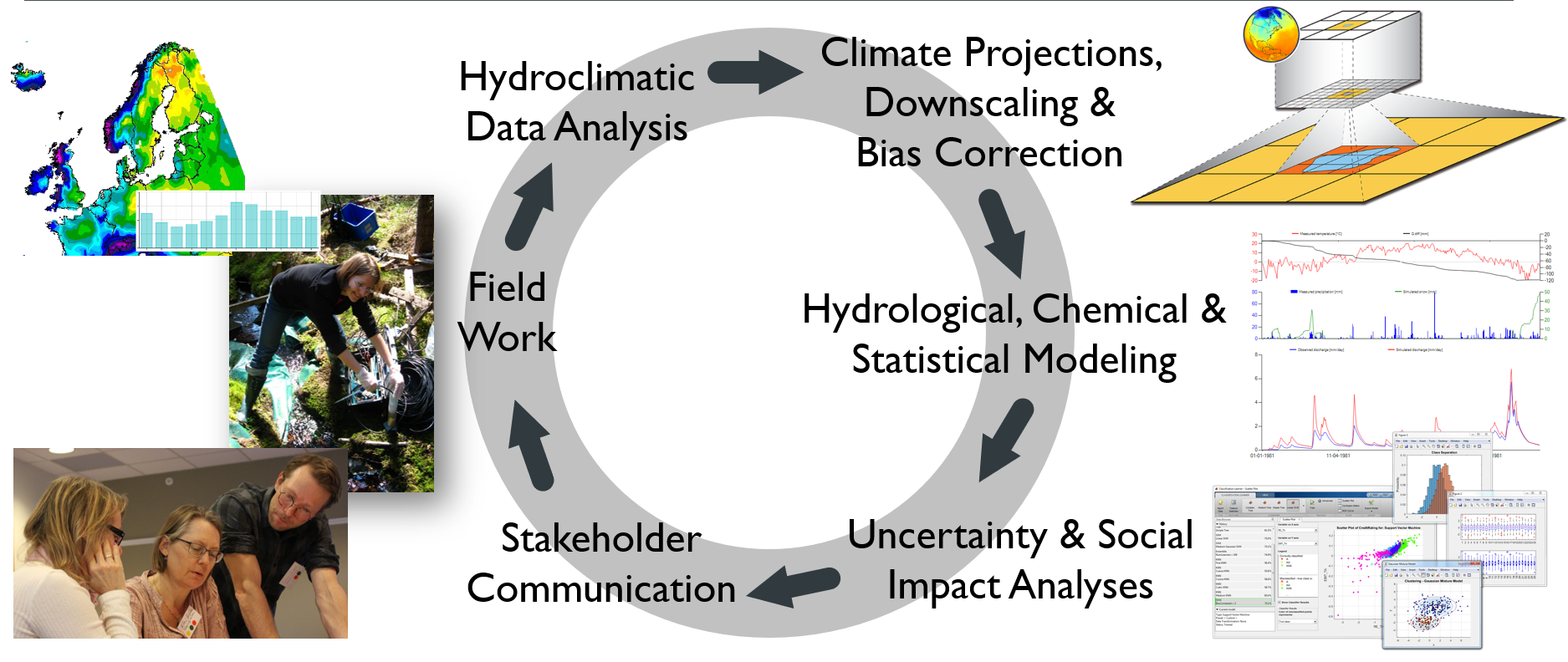Research
My research interests are broad and interdisciplinary in nature, and lately, I have been increasingly intrigued by the interaction between climate, hydrological processes, land-cover and human activities.

My research activities combine (1) hydro-climatic data analysis, (2) climate projections, downscaling and bias correction, (3) hydrological, chemical and statistical modeling across several spatial (plot to country) and temporal scales (hours to decades), (4) uncertainty and social impact analyses, (5) stakeholder communication, and (6) field work.
Professional Qualifications:
- 2013: PhD degree in Physical Geography with Specialization in Hydrology, Stockholm University, Sweden
- 2022: Docent/Habilitation in Hydrology, Uppsala University, Sweden
Research Themes and Related Projects
Overall, I have been building expertise and collaborations around 5 core research interests:
1 Hydrological Modeling for Climate-Change Impact studies
The goal of my research is to fill existing knowledge gaps that currently limit our understanding and the reliable projections of climate change impacts on water resources. I aim at strengthening the basis for robust projections of future hydrological climate change impacts by carefully assessing existing approaches and by developing new dynamic and multidimensional methods to reduce uncertainties.
- 2018-2022 VR (The Swedish Research Council), Starting Grant in Natural & Engineering Sciences: ‘Reducing Uncertainties in Climate Change Impact Research to Improve Robustness of Future Streamflow Simulations’, PI
2 Landscape controls on hydrological responses
A process-oriented perspective is key for understanding hydrological responses to climate and anthropogenic changes and their control by landscape characteristics. I am currently collaborating with SMHI and colleagues at SLU to determine the storage and release characteristics of wetland catchments and define parsimonious modeling strategies to quantify this function in peatlands and wetlands. My role is to explore how different types of wetlands will function under future climate conditions in different topographic settings. Furthermore, I also study hydrological processes at the landscape scale in the recently initiated FORMAS project PredPeat that unites experts in ecology, biogeochemistry, remote sensing, and hydrology to predict the effects of peatland rewetting on water retention and water quality.
- 2025-2029 EU, HORIZON2020: HORIZON-MISS-2024-SOIL-01-08: ‘FORPEAT: FORest PEATtland ecosystem assessment and targeted management for enhanced carbon sequestration, biodiversity and water quality‘
- 2023-2026 FORMAS, ‘Predicting the effects of peatland rewetting on water retention and water quality‘, WP lead
- 2020-2024 Naturvårdsverket (Swedish EPA), “Wetland ecosystem services” call: ‘Evidence-based Decision Support for Hydrological Ecosystem Services from Wetlands‘, WP lead
3 Surface-water chemistry
Climate-induced changes in the water cycle directly affect water chemistry at the landscape scale. In my research, I attempt to resolve land-water interactions across boreal/hemiboreal Sweden in the face of a changing climate with help of versatile modeling frameworks to maximize the information value of existing measurement time series.
- 2016-2018 VR (Swedish Research Council), Project Research Grant: ‘Hydrological Connectivity: Quantifying a key to surface water chemistry in future climates’, WP lead
4 Hydrological extremes — hazards, perception, and management
Sweden, a country commonly associated with water abundance, has been facing recurring problems of declining streamflow and groundwater levels during recent years. Funded by a FORMAS grant, I study spatio-temporal trends and patterns in streamflow droughts in Sweden, and analyze the perception, preparedness and management of drought events by local water managers across Sweden. I also study the impacts of a chaning climate on groundwater systems, as well as winter heatwaves and their impacts on water export and water quality from mining sites in Sweden:
- 2024-2027 FORMAS (The Swedish Research Council for Environment, Agricultural Sciences and Spatial Planning), project grant, ‘Towards a sustainable and resilient water supply in Sweden: Holistic solutions to groundwater drought & water scarcity‘, WP lead
- 2024-2027 FORMAS (The Swedish Research Council for Environment, Agricultural Sciences and Spatial Planning), Research and development project grant for young research leaders: ‘Impact of winter heat waves on the mining-affected environment: mobilization and redistribution of pollutants under a changing climate’, WP lead
- 2016-2023 FORMAS (The Swedish Research Council for Environment, Agricultural Sciences and Spatial Planning), Research and development project grant for young research leaders: ‘Hydrological droughts in Sweden now and in the future: Hotspots of hazard, vulnerability, and risk’, PI
My work on droughts and the application of the IPCC’s risk framework for societal drought risk assessments has inspired me to extend this approach to the context of ecosystem services. I now lead a European project in collaboration with partners from Spain, Finland, Austria, and Slovakia to evaluate the risks posed by hydroclimatic extremes – including heatwaves, heavy rainfall, droughts, and flooding – on freshwater ecosystems such as streams and wetlands. The project spans diverse study sites across forested landscapes in Europe, encompassing various human pressures such as forestry, wetland drainage, afforestation, and tourism:
- 2025-2027 Water4All Transnational Call “Ecosystem Services”: ‘REACTION – Navigating the Risks of Hydroclimatic Extremes for Freshwater Ecosystem Services in Forest Landscapes‘, PI
5 Water-energy-food-ecosystem nexus
Working on the interactions of water, energy, and food in a changing climate in Sweden has widened my perception of the complex systems around us and transformed my view of our environment as a complex and constantly changing system that overlaps and interlinks with the society. Much of my research focuses on the water-energy-food-environment (WEFE) nexus, a concept to address complex resource and development challenges.
- 2024-2025 Swedish Contingency Agency (MSB), Knowledge Synthesis project titled “Food, water, energy and transport security: Resilience to climate-related extremes“, WP lead
- 2021-2025 eSSENCE – The Swedish e-Science collaboration, Call for projects in data-intensive computing: ‘SWEFE-NEXT The Swedish Water-Energy-Food-Ecosystem Nexus and its response to hydroclimatic EXTreme events‘, PI
- 2021-2025 EU, HORIZON2020: H2020-LC-CLA-2020-2: ‘NEXOGENESIS: Facilitating the next generation of effective and intelligent water-related policies utilizing artificial intelligence and reinforcement learning to assess the water-energy-food-ecosystem (WEFE) nexus’, WP lead
- 2019-2025 Join VR/FORMAS/SIDA/FORTE, ”Sustainability and Resilience” call: ‘Impacts of Recent El-Niño Southern Oscillation (ENSO) on the Water-Food-Energy Nexus in South Asia’, PI
- 2016-2020 EU, HORIZON2020: WATER-2b-2015 grant: ‘SIM4NEXUS: Sustainable Integrated Management FOR the NEXUS of water-land-food-energy-climate for a resource-efficient Europe’, Case Study lead